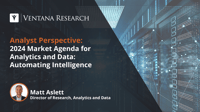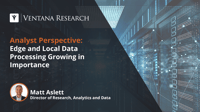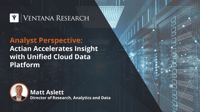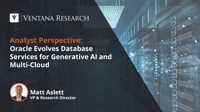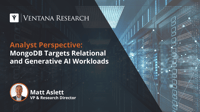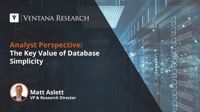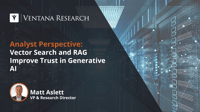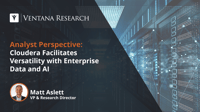I am happy to share insights gleaned from our latest Buyers Guide, an assessment of how well software providers’ offerings meet buyers’ requirements. The Data Platforms Ventana Research Buyers Guide is the distillation of a year of market and product research by ISG and Ventana Research.
Read More
Topics:
Data Platforms,
Analytics & Data,
analytic data platforms,
Operational Data Platforms
The increasing importance of intelligent operational applications driven by artificial intelligence (AI) is blurring the lines that have traditionally divided the requirements between operational and analytic data platforms. Operational data platforms have traditionally been deployed to support applications targeted at business users and decision-makers to run the business, with analytic data platforms typically supporting applications used by data and business analysts to analyze the business.
Read More
Topics:
embedded analytics,
Cloud Computing,
AI & Machine Learning,
Analytics & Data,
analytic data platforms,
Operational Data Platforms
Ventana Research recently announced its 2024 Market Agenda for Analytics and Data, continuing the guidance we have offered for two decades to help enterprises derive optimal value and improve business outcomes.
Read More
Topics:
embedded analytics,
Business Intelligence,
Data Governance,
Data Management,
natural language processing,
data operations,
Process Mining,
Streaming Analytics,
AI & Machine Learning,
Analytics & Data,
Streaming Data & Events,
analytic data platforms,
Operational Data Platforms
Discussion about potential deployment locations for analytics and data workloads is often based on the assumption that, for enterprise workloads, there is a binary choice between on-premises data centers and public cloud. However, the low-latency performance or sovereignty characteristics of a significant and growing proportion of workloads make them better suited to data and analytics processing where data is generated rather than a centralized on-premises or public cloud environment. ...
Read More
Topics:
Cloud Computing,
Internet of Things,
Data,
Digital Technology,
AI & Machine Learning,
Analytics & Data,
analytic data platforms,
Operational Data Platforms
As articulated in Ventana Research’s Data Platforms Buyer’s Guide and DataOps Buyer’s Guide research, the combination of cloud computing and advanced analytics has lowered the cost of storing and processing large volumes of data, accelerating the emergence of new data platform and data operations products that enable organizations to gain operational efficiency and competitive advantage. The right combination of data platform and data management products is essential to ensure that the right...
Read More
Topics:
Data Management,
Data,
Digital Technology,
data operations,
Analytics & Data,
analytic data platforms,
Operational Data Platforms
I previously described how Oracle had positioned its database portfolio to address any and all data platform requirements. The caveat to that statement at the time was that any organization wanting to take advantage of the company’s flagship Oracle Autonomous Database could only do so using Oracle Cloud Infrastructure (OCI) cloud computing service, their own datacenter or a hybrid cloud environment. The widespread popularity of Oracle Database and the advanced automation capabilities delivered...
Read More
Topics:
Analytics,
Business Intelligence,
Cloud Computing,
Data Management,
Data,
Digital Technology,
AI & Machine Learning,
Analytics & Data,
analytic data platforms,
Operational Data Platforms
I previously wrote about how document-database providers have added support for ACID transactions and the SQL query language, making their products increasingly suitable for use as replacements for applications that previously depended on relational databases. Adoption of non-relational NoSQL databases is by no means reliant on displacing incumbent relational databases, and initial adoption is often driven by differentiating capabilities, such as developer agility and application flexibility....
Read More
Topics:
Data,
Operational Data Platforms
I have previously written about the functional evolution and emerging use cases for NoSQL databases, a category of non-relational databases that first emerged 15 or so years ago and are now well established as potential alternatives to relational databases. NoSQL is a term used to describe a variety of databases that fall into four primary functional categories: key-value stores, wide-column stores, document-oriented databases and graph databases. Each is worthy of further exploration, which is...
Read More
Topics:
Cloud Computing,
Data,
Digital Technology,
Analytics & Data,
Operational Data Platforms
I previously discussed the trust and accuracy limitations of large language models, suggesting that data and analytics vendors provide guidance about potentially inaccurate results and the risks of creating a misplaced level of trust. In the months that have followed, we are seeing some clarity from these vendors about the approaches organizations can take to increase trust and accuracy when developing applications that incorporate generative AI, including fine-tuning and prompt engineering. It...
Read More
Topics:
Analytics,
Business Intelligence,
Data,
Digital Technology,
natural language processing,
AI & Machine Learning,
Analytics & Data,
analytic data platforms,
Operational Data Platforms
The data platforms market may appear to have little or nothing to do with haute couture, but it is one of the data sectors most strongly influenced by the fickle finger of fashion. In recent years, various architectural approaches to data storage and processing have enjoyed a phase in the limelight, including data warehouse, data mart, data hub, data lake, cloud data warehouse, object storage, data lakehouse, data fabric and data mesh. These approaches are often heralded as the next big thing,...
Read More
Topics:
Cloud Computing,
Data Governance,
Data Management,
Data,
Digital Technology,
data operations,
AI & Machine Learning,
Analytics & Data,
Streaming Data & Events,
analytic data platforms,
Operational Data Platforms



